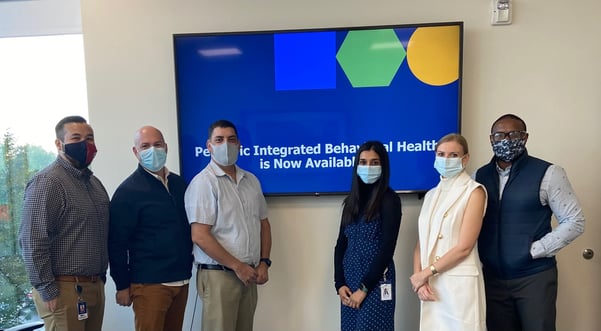
From left to right: Humberto Perez, Steve Biljan, Jeff Ainsa,
Sofia Ahmed, Dr. Ruth Nutting, and Sentari Minor
According to the latest data from the Centers for Disease Control and Prevention (CDC), more than a third of high school students reported experiencing poor mental health during the COVID-19 pandemic. Last year, the American Academy of Pediatrics, American Academy of Child and Adolescent Psychiatry, and Children's Hospital Association declared a national emergency in children's mental health. As a leader in the integration of behavioral health services, evolvedMD realizes the need for being proactive to better serve this population during this crisis, prompting us to tackle the increased demand for high-quality mental health services. To address this harrowing need, evolvedMD recently launched an innovative integrated pediatric behavioral health program in collaboration with Granger Medical Clinic in Salt Lake City.
It’s understood that the foundation for lifelong health, well-being, and prosperity is developed in early childhood. Yet, one in five children struggle with a mental health condition—and only half receive appropriate treatment. According to the American Medical Association (AMA), 80% of pediatricians surveyed who provide primary care to ages nine and older reported having had a patient attempt suicide during their career; only half of the pediatricians survey reported feeling prepared to talk about suicide prevention. Stigma, a shortage of behavioral health specialists, limited access, and lack of preparedness are just a few barriers preventing many children and adolescents from receiving life-saving interventions and care.
At evolvedMD, we see the urgent need for pediatricians and behavioral health professionals to address this crisis before it worsens.
What’s Being Done Now to Address the Pediatric Mental Health Crisis?
When Children's Hospital Colorado declared a state of emergency for pediatric mental health in May 2021, it prompted the organization to increase mental health inpatient, outpatient, and day services by more than 50% by March 2022. Elsewhere, hospitals offer telehealth services to address children’s needs during and after the pandemic. The AMA recently hosted a Behavioral Health Integration Collaborative webinar where a pediatrician shared how her practice implements suicide screening and prevention efforts, such as leveraging screening tools for identifying suicide risk, providing ongoing care and follow-up, and more.
These initiatives are thoughtful, valuable, and much-needed. evolvedMD is working to boost and bolster these efforts by integrating behavioral health services into primary care practices. With our enhanced collaborative care model, it is our goal to help more kids in need and give providers the tools necessary to provide life-saving care.
The Case for Collaborative Care
Over the past decade, there has been demonstrable evidence for collaborative care, in which primary care providers and behavioral health providers work in tandem to treat patients with adverse behavioral health symptoms. One study in 2014 assessed the effect of collaborative care for behavior problems and anxiety in pediatric primary care. The researchers’ findings over 18 months provided support for integrated behavioral health services. In 2016, the American Psychiatric Association (APA) and the Academy of Psychosomatic Medicine (APM) released a joint report highlighting evidence for integrated care. They found that the collaborative care model has the most evidence among integrated healthcare models for improving access to care and increasing patient satisfaction in various primary care settings.
Integrated Pediatric Behavioral Health Program
Since its founding in 2017, evolvedMD has worked hard to reimagine the future of behavioral health. Our unique, upfront, and ongoing collaborative care model embed behavioral health specialists at primary care practices across Arizona and Utah. Being a forward-thinking company, we’ve recognized the need to improve access to mental health services for both children and adolescents, and so we’ve pivoted to expand our services to better serve this population.
Over the past several months, evolvedMD’s Director of Clinical Programs Dr. Ruth Nutting spearheaded developing an innovative integrated pediatric behavioral health program at Granger Medical Clinic, one of our Utah-based partners. Working collaboratively with the clinic’s teams, Dr. Nutting and her team at evolvedMD successfully launched the program on October 6th of last year.
What does this mean for children, adolescents, and their families? At a time when Utah ranks among a group of states as having the highest prevalence of mental health disorders in youth age 6-17 as well as youth with untreated mental health needs, the integrated pediatric behavioral health program will enable families to get much-needed treatment in the same building as their pediatrician.
As we continue to rapidly expand our services nationwide, our goal is to launch more integrated pediatric behavioral health programs with our current partners at their sites and new partners throughout the country. In the coming months and years, we look forward to making a tremendous impact on pediatric mental health that ultimately makes families happier and healthier.
To learn more about the integrated pediatric behavioral health program, please contact Dr. Nutting at rnutting@evolvedmd.com. If you think you would like to integrate behavioral health services at your pediatric site, please contact Kim Ho at kho@evolvedmd.com.